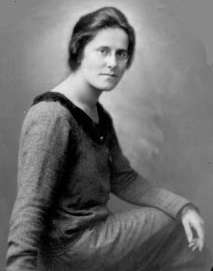Bertha Bracey
| Bertha Bracey | |
|---|---|
 | |
| Born |
1893 Bournville |
| Died | 1989 at age 95 |
| Occupation | teacher, youth worker, aid worker |
Bertha Lilian Bracey (1893–1989) was a Quaker teacher and aid worker who organised relief and sanctuary for Europeans affected by the turmoil before and during the Second World War. These included many Jewish children threatened by the Holocaust and rescued in the operation known as the Kindertransport.
Early life and education
She went to Birmingham University and, after graduating, she worked as teacher for 5 years.[1]
Quaker relief work
She joined the Society of Friends – the Quakers – when she was nineteen.[1] In 1921, she left teaching to work at the Quaker Centre in Vienna where she founded and operated youth clubs. The Quaker International Centres had been conceived by Carl Heath in 1916 and eight of them were established across Europe after the First World War. After Vienna, Bracey moved to Germany where the hyperinflation and instability of the Weimar Republic caused great hardship. At the centres in Nuremberg and then Berlin, she organised aid for the population, especially children. The provision of food to the impoverished and starving was known as the Quäkerspeisung – the Quaker feeding – and it so endeared the Quakers to the German people that it enabled them to aid refugees during the Nazi era.[2]
In 1929, she became an Administrative Secretary in the Quaker headquarters in London, responsible for the relief operations in Germany and Holland.[3]
Schools
She helped found the Stoatley Rough School for German refugees in Haslemere in England.[4] This started when Hilde Lion contacted the German Emergency Committee in 1933 with plans to form a school to help German children adjust to British education. Bracey chaired the board of governors from 1938 to 1945 and continued as a governor of the school until 1960.[5]
In 1934, she helped establish a school for German Jewish children in the castle of Eerde in Holland.[6]
Kindertransport
Bracey had recognised the threat to the Jews of Germany in 1933, after Hitler became Chancellor and the Nazi party took control, "Words are not adequate to tell of the anguish of some of my Jewish friends".[3] After the great pogrom of Kristallnacht in 1938, she visited Berlin and was then part of the delegation which met with the British Home Secretary Sir Samuel Hoare to convince him to expedite the acceptance of Jewish children as refugees from Germany. She then led the Quaker team which formed part of the Movement for the Care of Children from Germany. Initially they were based in Friends House but this was overcrowded and so the Palace Hotel in Bloomsbury Street was bought to become Bloomsbury House – a centre for all the refugee organisations to work together. Bracey became secretary of the Inter-Church Council for German Refugees and led a team of 80 Quaker case-workers on the third floor.[7]
Awards and memorials
In 2010, she was recognised as a British Hero of the Holocaust by Prime Minister Gordon Brown.[8]
References
Citations
- 1 2 Smith 2013, p. 31.
- ↑ Smith 2013, pp. 31-34.
- 1 2 Smith 2013, p. 34.
- ↑ ESP 2012.
- ↑ SRS 2004.
- ↑ Smith 2013, p. 37.
- ↑ Smith 2013, p. 45.
- ↑ Blake 2010.
Sources
- Blake, Heidi (10 March 2010), "The remarkable stories of Britain's Heroes of the Holocaust", Daily Telegraph
- Bramsted, Eric (2010), Bertha Bracey OBE
- Bryan, Alex (January 1991), "Bertha L. Bracey: Friend of the Oppressed", Friends' Quarterly: 233–241
- "Stoatley Rough School", Exploring Surrey's Past, 2012
- Grunwald-Spier, Agnes (2010), The Other Schindlers: Why Some People Chose to Save Jews in the Holocaust, The History Press, ISBN 9780752462431
- Kurer, Peter (2006), "How Did You Escape from Nazi Europe?" (PDF), Association of Jewish Refugees, 6 (6): 5
- Lampos, Cleo (31 May 2013), The Sound of a Train Whistle
- "Kindertransport", Quakers in the World
- Seymour, Miranda (2013), Noble Endeavours, Simon and Schuster, ISBN 9781847378262
- Smith, Lyn (2013), "Bertha Bracey", Heroes of the Holocaust: Ordinary Britons Who Risked Their Lives to Make a Difference, Random House, ISBN 9780091940683
- The Founding of Stoatley Rough School, Stoatley Rough School Historical Trust, 2004
- Taylor, Jennifer (2009), The Missing Chapter: How the British Quakers Helped to Save the Jews of Germany and Austria from Nazi Persecution, Research Centre for German and Austrian Exile Studies, University of London
- Williams, Bill (2013), Jews and Other Foreigners: Manchester and the Rescue of the Victims of European Fascism, 1933–40, Oxford University Press, ISBN 9780719089954
- Woodford, Jane (2011), "Bertha Bracey – helping children to a safe home" (PDF), Journeys in the Spirit, Quaker Life (57)
Publications
- Bracey, Bertha (1944), "Europe's Displaced Persons and the Problems of Relocation", International Affairs, Royal Institute of International Affairs, 20 (2): 225–243, doi:10.2307/3018099